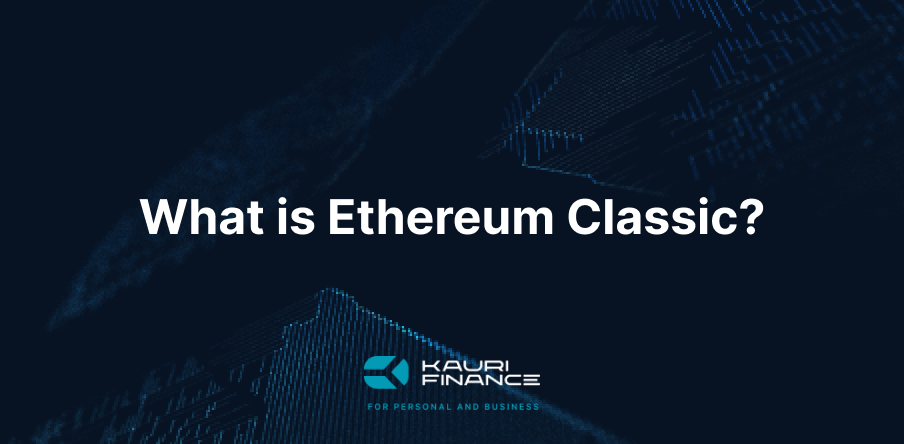
What is Ethereum Classic (ETC)?
- The History of Ethereum Classic
- Ethereum Classic vs Ethereum: Key Differences
- Features and Functionality of Ethereum Classic
- Ethereum Classic's Market Performance
- The Future of Ethereum Classic
- Investing in Ethereum Classic: Risks and Opportunities
- Frequently Asked Questions About Ethereum Classic (ETC)
- What makes Ethereum Classic different from other cryptocurrencies?
- Is Ethereum Classic a good investment in 2024?
- How does the Ethereum Classic blockchain ensure security?
- Can Ethereum Classic smart contracts interact with Ethereum's?
- What are the main use cases for Ethereum Classic?
- How can I buy and store Ethereum Classic?

Born from a philosophical divide, ETC preserves the original Ethereum vision, championing "code is law." With its distinctive green logo, ETC offers a unique platform for smart contracts and DApps, prioritizing censorship resistance and true decentralization in the ever-evolving blockchain landscape.
As we delve into the fascinating history of Ethereum Classic, we'll uncover the pivotal events that shaped this unique blockchain.
The History of Ethereum Classic
Ethereum Classic emerged from a watershed moment in blockchain history. In 2016, a hack on Ethereum's decentralized autonomous organization (DAO) ignited a fierce debate, culminating in a contentious hard fork.
-
"Code is law" proponents championed immutability
-
Ethereum's majority enacted a controversial rollback
-
A minority preserved the original, unaltered chain
This philosophical rift birthed Ethereum Classic, symbolized by its green logo. ETC embodies the original vision, prioritizing decentralization and censorship resistance in the dynamic crypto landscape. It stands as a testament to blockchain principles, offering an alternative path in the evolving digital asset ecosystem.
Now that we understand ETC's origins, let's explore how it differs from its more famous sibling, Ethereum.
Ethereum Classic vs Ethereum: Key Differences
While Ethereum Classic (ETC) and Ethereum (ETH) share common roots, their paths diverged dramatically post-DAO hack. ETC's unwavering commitment to immutability contrasts sharply with ETH's flexible approach, manifesting in tangible technical differences that shape two distinct blockchain ecosystems.
|
Aspect |
Ethereum Classic (ETC) |
Ethereum (ETH) |
|
Consensus |
Proof-of-Work (PoW) |
Proof-of-Stake (PoS) |
|
Scalability |
Limited, ~15 TPS |
Enhanced, 100,000+ TPS via sharding |
|
Smart Contracts |
Original EVM |
Upgraded EVM with EIP-1559 |
|
Development Focus |
Decentralization, Immutability |
Efficiency, Innovation, Sustainability |
ETC's adherence to PoW aligns with its core principles but limits scalability. Conversely, ETH's shift to PoS and layer-2 solutions addresses growing network demands. These approaches reflect deeper ideological differences, influencing their trajectories in the evolving blockchain landscape.
With the key differences between ETC and ETH in mind, let's examine the specific features and functionality that make Ethereum Classic unique.
Features and Functionality of Ethereum Classic
Ethereum Classic (ETC) embodies blockchain immutability, offering unique features that set it apart in the crypto landscape. At its core, ETC preserves the original Ethereum vision, prioritizing decentralization and censorship resistance.
-
Smart Contracts: Enabling trustless, automated agreements
-
DApps: Fostering innovation without central control
-
Proof-of-Work: Ensuring network security and fair mining
-
Unaltered History: Maintaining blockchain integrity since inception
-
EVM Compatibility: Supporting Ethereum-based project migration
ETC's commitment to these principles attracts developers seeking true decentralization, presenting both challenges and opportunities in the evolving crypto ecosystem.
Now that we've explored ETC's features, let's analyze its market performance to gauge its investment potential.
Ethereum Classic's Market Performance
Ethereum Classic's market performance mirrors the cryptocurrency landscape's volatility. Since inception, ETC has weathered dramatic price swings, network attacks, and market downturns, showcasing remarkable resilience. Its trading volume and market cap fluctuate significantly, influenced by broader crypto trends and its unique value proposition.
In the crucible of market volatility, Ethereum Classic forges its path, each price movement etching the blockchain's unwavering commitment to immutability and decentralization.
While not matching Ethereum's dominance, ETC's adherence to founding principles attracts a dedicated community, positioning it for potential growth in niche blockchain applications.
With a clear picture of ETC's market performance, let's look ahead to what the future might hold for this resilient blockchain.
The Future of Ethereum Classic
Ethereum Classic stands at a pivotal crossroads, balancing its core principles with the need for evolution. The roadmap emphasizes scalability and interoperability enhancements, exploring sidechains and layer-2 solutions to boost transaction throughput without compromising security. ETC's future may lie in becoming a beacon of immutability, attracting developers who prioritize censorship resistance. As blockchain interoperability advances, ETC could carve a niche in cross-chain applications, leveraging its unaltered history. However, success hinges on community support and innovation in a competitive market. ETC's journey exemplifies the delicate balance between preserving founding ideals and adapting to technological progress.
As we consider ETC's future prospects, it's crucial to weigh the potential risks and opportunities for investors.
Investing in Ethereum Classic: Risks and Opportunities
Investing in Ethereum Classic offers unique opportunities and risks. Its commitment to immutability attracts purists but may limit scalability. ETC's potential for growth contrasts with vulnerability to attacks.
-
Opportunity: Niche for immutable smart contracts
-
Risk: Limited adoption vs. Ethereum
-
Opportunity: Potential value appreciation
-
Risk: Regulatory uncertainties
Investors should weigh ETC's principles against technical limitations when considering inclusion.
Now that we've covered the key aspects of Ethereum Classic, let's address some frequently asked questions to deepen our understanding.
Frequently Asked Questions About Ethereum Classic (ETC)
What makes Ethereum Classic different from other cryptocurrencies?
Ethereum Classic stands out with its unwavering commitment to blockchain immutability. ETC preserves the original Ethereum vision, rejecting contentious forks. Its green logo symbolizes decentralization and censorship resistance, attracting developers seeking a truly immutable smart contract platform.
Is Ethereum Classic a good investment in 2024?
Investing in Ethereum Classic in 2024 remains speculative. Its immutability attracts niche developers, but scalability challenges persist. Market volatility and regulatory uncertainties pose risks. Potential upside exists if ETC carves its role in the blockchain ecosystem. Thorough research is crucial before investing.
How does the Ethereum Classic blockchain ensure security?
Ethereum Classic's security relies on its Proof-of-Work consensus mechanism, utilizing SHA3 cryptography. This robust architecture deters 51% attacks and ensures transaction integrity. ETC's immutable ledger and decentralized node network further bolster its resilience against malicious actors, preserving the blockchain's sanctity and attracting security-conscious developers.
Can Ethereum Classic smart contracts interact with Ethereum's?
Ethereum Classic and Ethereum smart contracts share EVM compatibility, but direct interaction is limited. Emerging cross-chain solutions and bridges facilitate interoperability, allowing developers to leverage both ecosystems' strengths while maintaining distinct principles.
Let's explore Ethereum Classic's unique use cases in the blockchain space.
What are the main use cases for Ethereum Classic?
Ethereum Classic champions immutable smart contracts, fostering censorship-resistant DApps. Its blockchain secures digital assets, enabling trustless transactions. ETC's "code is law" ethos attracts developers seeking an incorruptible platform for innovative financial instruments and autonomous organizations.
How can I buy and store Ethereum Classic?
Acquiring Ethereum Classic is straightforward through major cryptocurrency exchanges. After registration and verification, purchase ETC using fiat or other cryptocurrencies. For secure storage, opt for hardware wallets like Ledger or software wallets such as Trust Wallet, ensuring you safeguard your private keys. Regular market research enhances investment decisions.
